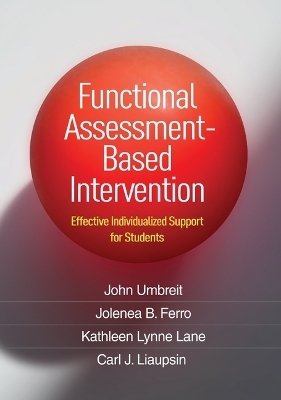
Functional Assessment-Based Intervention
Guilford Press (Verlag)
978-1-4625-5382-2 (ISBN)
John Umbreit, PhD, is Professor Emeritus of Special Education at the University of Arizona, where he previously served as Professor of Special Education in the College of Education and as Professor of Family and Community Medicine in the College of Medicine. Dr. Umbreit specializes in the areas of behavioral analysis and positive behavioral supports. His research focuses on functional assessment-based intervention and positive behavioral interventions and supports in natural environments such as schools, homes, and the workplace. He has been a visiting professor in special education at the University of Washington, an editorial board member or manuscript reviewer for 17 professional journals, a frequent reviewer of grant proposals for the U.S. Department of Education, and Principal Investigator for 18 research and personnel preparation grants. Jolenea B. Ferro, PhD, BCBA-D, is Research Associate Professor in the Department of Child and Family Studies at the University of South Florida and Training Director for the Florida Center for Inclusive Communities, the University's Center for Excellence in Developmental Disabilities. Dr. Ferro has developed interventions and supports for learners with severe behavior problems and has extensive experience in inservice and preservice education. Her research focuses on functional assessment and implementation of positive behavioral interventions and supports (PBIS) in natural settings. Dr. Ferro is the author of many journal articles and chapters related to functional behavioral assessment, treatment integrity, and PBIS leadership training. Kathleen Lynne Lane, PhD, BCBA-D, is a Roy A. Roberts Distinguished Professor in the Department of Special Education and Associate Vice Chancellor for Research at the University of Kansas. Dr. Lane’s research interests focus on designing, implementing, and evaluating comprehensive, integrated, three-tiered (Ci3T) models of prevention to prevent the development of learning and behavior challenges and to respond to existing instances, with an emphasis on systematic screening. She is coeditor of Remedial and Special Education and has published 14 books, more than 230 refereed journal articles, and 55 book chapters. Carl J. Liaupsin, EdD, is Professor and Department Head of the Department of Disability and Psychoeducational Studies at the University of Arizona. Dr. Liaupsin has workedas a teacher of students with emotional and behavioral disorders, as a full-time behavior specialist for a midwestern school district, and as a research associate for the National Center on Positive Behavioral Interventions and Supports and the National Center on Education, Disability, and Juvenile Justice. His research interests include the validation of function-based behavior intervention methods, development and evaluation of effective training in intervention practices, and use of technology-based tools to support teachers who work with students who exhibit challenging behavior. He is the author or coauthor of numerous peer-reviewed publications and media-based professional development products, and has served as the coordinator and editor for leading journals in his field.
I. Introduction and Overview
1. An Introduction to Functional Assessment-Based Interventions
2. Primer on Behavior Analysis
II. Step 1--Identifying Students Who May Need a Functional Assessment-Based Intervention
3. Working in Tiered Systems of Support: A Focus on Tier 3 considerations
4. Identifying Students Who May Benefit from a FABI
III. Step 2--Conducting the Functional Assessment
5. Getting Started: Understanding the Context
6. Functional Assessment Interviews: Identifying the Problem and Establishing the Target Behaviors
7. Functional Assessment: Direct Observation
8. Determining the Function of the Behavior: The Function Matrix
IV. Step 3--Collecting Baseline Data
9. Identifying the Dimension of Interest and Selecting an Appropriate Measurement System
10. Getting Started: Collecting Baseline Data
V. Step 4--Designing the Functional Assessment-Based Intervention
11. Designing and Testing the Intervention
12. Intervention Method 1: Teach the Replacement Behavior
13. Intervention Method 2: Adjust the Environment
14. Intervention Method 3: Shift the Contingencies
15. Intervention Methods 1 and 2: Teach the Replacement Behavior and Adjust the Environment
16. Treatment Integrity
17. Social Validity
18. Generalization and Maintenance
19. Designing Your Intervention
VI. Step 5--Testing the Intervention
20. Determining Intervention Outcomes
21. Wrapping It Up: Ending with a Defensible FABI
VII. Getting Started in Your Own Context
22. Implementation Considerations
23. A Step-by-Step Training Model: One Approach to Building Capacity
Appendix. Published Research on the FABI Model
FABI Completion Checklists
- Completion Checklist. Step 1: Identifying Students Who Need a FABI
- Completion Checklist. Step 2: Conducting the Functional Assessment
- Completion Checklist. Step 3: Collecting Baseline Data
- Completion Checklist. Step 4: Designing the Intervention
- Completion Checklist. Step 5: Testing the Intervention
References
Index
| Erscheinungsdatum | 18.04.2024 |
|---|---|
| Verlagsort | New York |
| Sprache | englisch |
| Gewicht | 1020 g |
| Themenwelt | Geisteswissenschaften ► Psychologie ► Entwicklungspsychologie |
| Geisteswissenschaften ► Psychologie ► Pädagogische Psychologie | |
| Medizin / Pharmazie ► Medizinische Fachgebiete ► Psychiatrie / Psychotherapie | |
| Sozialwissenschaften ► Pädagogik ► Sonder-, Heil- und Förderpädagogik | |
| ISBN-10 | 1-4625-5382-6 / 1462553826 |
| ISBN-13 | 978-1-4625-5382-2 / 9781462553822 |
| Zustand | Neuware |
| Haben Sie eine Frage zum Produkt? |
aus dem Bereich


